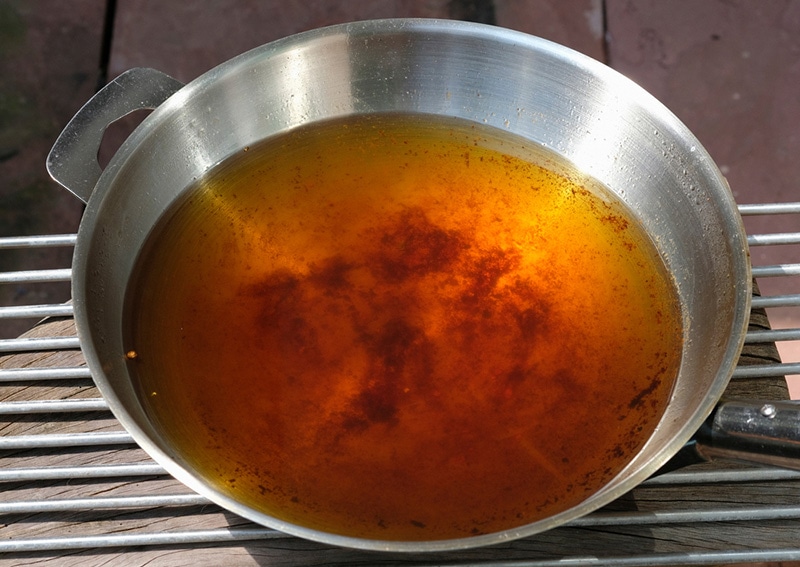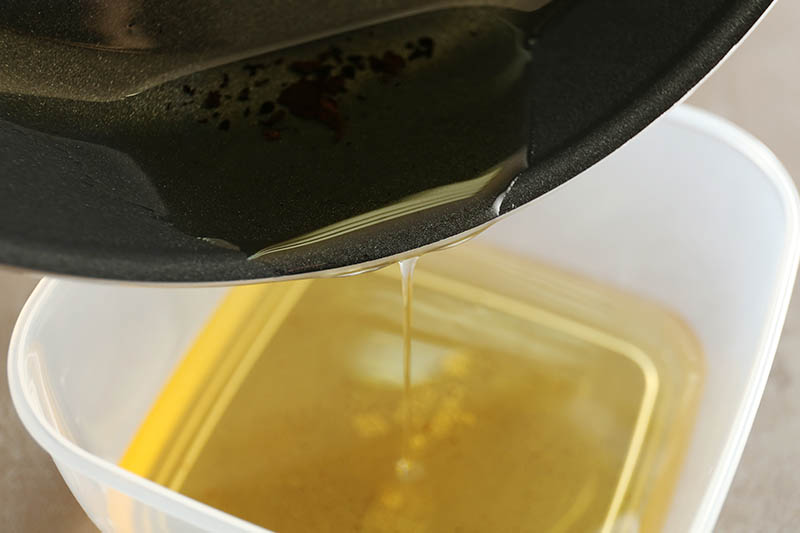Can You Put Grease Down the Drain? Disposal Tips & FAQ
-
Pete Ortiz
- Last updated:

Many people cannot resist the taste of greasy bacon, fried eggs, French fries, and deep-fried chicken. While this serves our taste buds, the waste is usually the part that is not given much thought. The kitchen sink is close by, and it’s the quickest and easiest way to dispose of any liquid. But can you put grease down the drain? No, grease should never be dumped in your sink. The grease will solidify in your pipes and result in costly repairs.
As the grease cools, it becomes a magnet for other dirt that can cause a clog, and if it makes it through your pipes, it can disrupt the sewer system.
What Happens When You Put Grease Down the Drain
If you have left a greasy pan for a few hours, you will notice that the left-over grease turns into a solid. If you pour the grease down the drain while it is still a liquid, the same thing happens, and it will congeal in your pipes.
Cooking oils will remain liquid no matter how long they are left out, but the oil does not mix with water. It will coat the inside of the pipes, making it easy for food particles to stick to it and eventually resulting in a clogged pipe.
If the grease does not cling to your pipes and instead flows into the sewers, the problem becomes more complicated. Oil from the surrounding homes and restaurants gathers there, and the grease build-up degrades over time to form fatty acids and glycerol.
The fatty acids combine with the calcium found in the sewer drains resulting from concrete corrosion and form soap-like compounds known as fatbergs. When the sewer levels rise, these compounds stick to the ceiling and become larger with time, resulting in a clogged sewer pipe.

What Can I Do If I Pour Grease Down the Drain?
If you have poured any grease or oil down your drain, it may contribute to the accumulation of deposits in your area’s sewer system, but there are some things you can do to help prevent clogs from accumulating in your pipes.
Pour a gallon of boiling water and some dish soap down the drain. Hot water will turn the grease into a liquid, allowing it to pass through your pipes. Check whether your pipes are metal or PVC before pouring boiling water since PVC pipes may melt in high temperatures.
You can clean your drain by pouring half a cup of baking soda, followed by an equal amount of white vinegar. The combination will cause a fizzing action which will help dissolve the fat. Wait for about 10 minutes, then rinse it out with boiling water.
Some drain cleaners claim to dissolve grease clogs but using them too frequently is bad for your plumbing.
How Do You Dispose of Grease?
So ultimately, you shouldn’t pour grease down your drain, but it still has to go somewhere, so what should you do with it?
- Allowing the grease to cool and dry in the air will protect you from accidental burns and allow it to solidify. This will make it easier to scrape it off the pan before you clean it.
- Scoop up the solidified grease out of your pan using a spatula or paper towel, but only once it has cooled down and is safe to handle.
- Dump the grease into a disposable container, and when the container is full, you can wrap it in a plastic bag and throw it in the trash.
- A paper towel can wipe away small amounts of leftover oil from the bottom of a pan.
- Return cooled cooking oil to the original container or another container to reuse.

Is it Possible to Compost Grease?
Cooking grease can be composted, but reuse and volume reduction are the best ways to manage grease. You can reduce the amount of grease in your kitchen by implementing some kitchen practices.
- Instead of pouring oil into the pot or pan, spray oil onto food or into pans to lightly coat before cooking. This will significantly reduce the volume of grease, as well as calories.
- If possible, use an air fryer instead of a deep fryer.
- A lot of oils and fats can be reused. Let the fat cool and strain it through a coffee filter into an airtight container. You can store it in the refrigerator for up to a month and use it for cooking and flavoring soups.
- If your community composting facility accepts cooking grease, place it in the food waste bin.
- Have a container specifically for cooking grease, like an old margarine container or pasta sauce jar. Each time you cook, drain your grease into the container. Once it is full, you can seal it and add it to your garbage.
Plant-based oils in small quantities are best for home composting. Pour the used oil over the pile and mix it in, but only up to 1 cup. If you use paper towels to clean the pot or pan, they can also be added to the compost bin.
Conclusion
Cooking grease should NOT be poured down your drain as it can cause complicated problems in your plumbing system. Furthermore, it can collect into your area’s sewer system, creating further issues. However, you can use one of the effective techniques we mentioned to dispose of your grease and prevent expensive plumbing repairs.
Featured Image Credit: k-02, Shutterstock
Contents


